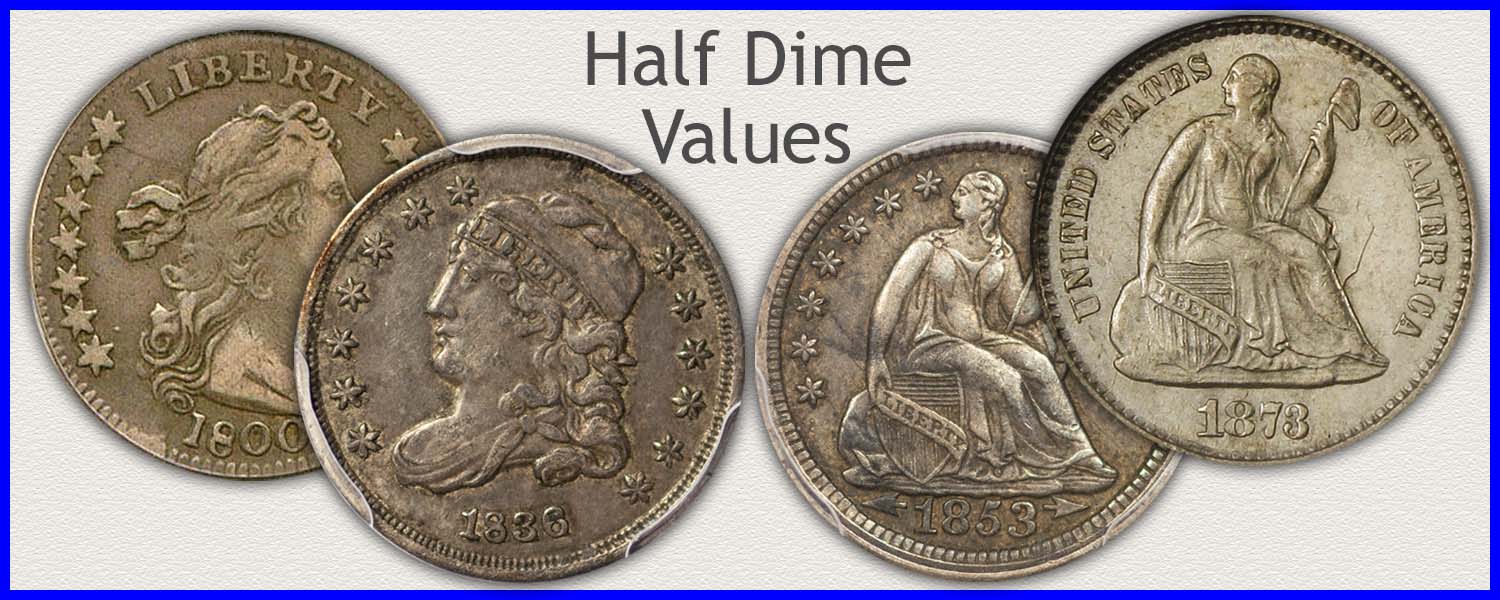Coin Values Moving with Precious Metals: Up-Dated 4/14/2025: Gold $3226 | Silver $31.88
Rising Seated Half Dime Value
A few key factors are identified to arrive at an accurate seated half dime value. A step by step method covers what is necessary. Half dimes are popular and many date and mintmark combinations are scarce to rare.
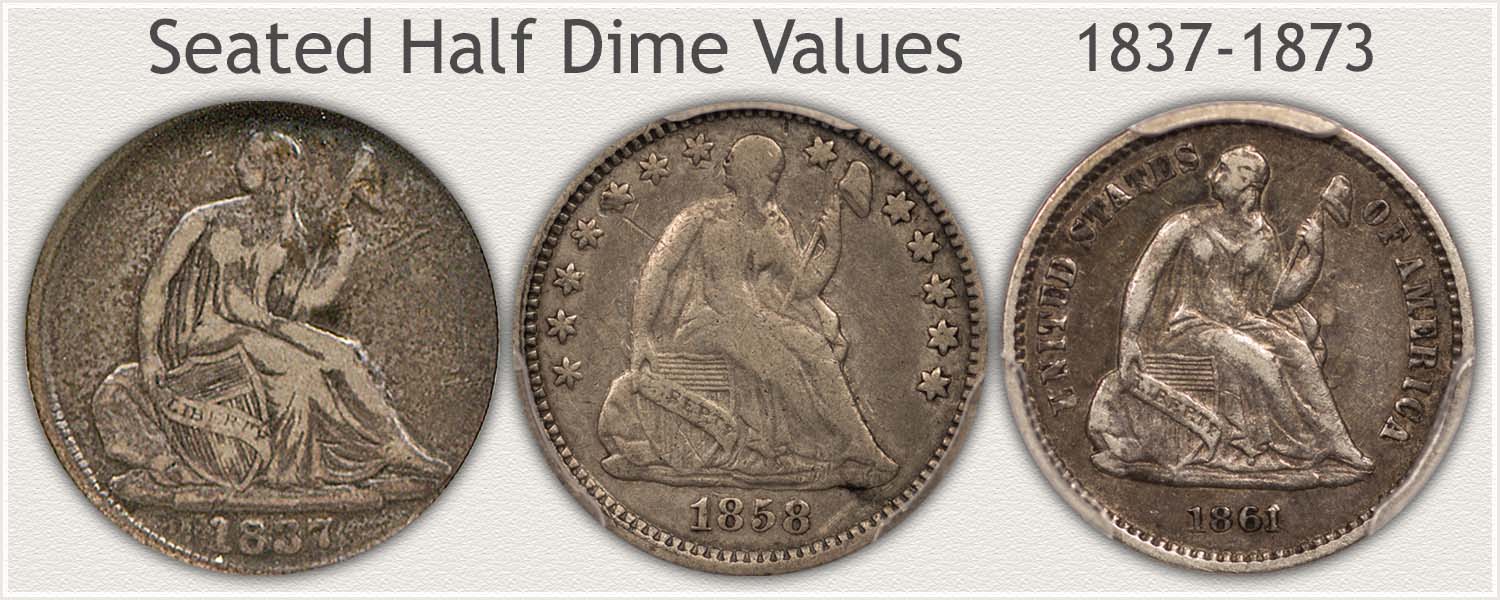
Steps Leading to Value:
- Step 1: Date and Mintmark Variety - Accurately identify the different varieties, dates and mintmarks spanning the Seated Half Dime series.
- Step 2: Grading Condition - Using images to judge and compare arriving at a grade.
- Step 3: Special Qualities - Minor varieties are highlighted to identify special coins.
Key elements are highlighted by the range in value on the chart. Follow the steps to locate how much your coin is worth.
| Seated Half Dime Value 1837-1873 | ||||
|---|---|---|---|---|
| Condition of Coin | ||||
| Date | Good | Fine | Extremely Fine | Mint State |
| Seated Half Dime Value Updated | 2025 | |||
| Stars on Obverse Type 1838 to 1859 | ||||
| $22 | $31 | $57 | $167 | |
| Legend on Obverse Type 1860 to 1873 | ||||
| $22 | $28 | $47 | $156 | |
| The Following are a Few Selected Dates | ||||
| 1841 | $20 | $34 | $64 | $176 |
| 1841 O | $66 | $80 | $206 | $929 |
| 1850 | $22 | $32 | $63 | $189 |
| 1850 O | $24 | $68 | $97 | $866 |
| 1853 No Arrows | ** | ** | $282 | $548 |
| 1853 O No Arrows | ** | ** | $2,854 | RARE |
| 1853 Arrows | $23 | $28 | $62 | $158 |
| 1853 O Arrows | $21 | $32 | $120 | $394 |
| 1854 | $20 | $34 | $49 | $155 |
| 1854 O | $20 | $31 | $87 | $780 |
| 1855 | $24 | $31 | $41 | $145 |
| 1855 O | $16 | $49 | $195 | $585 |
| 1856 | $21 | $33 | $64 | $154 |
| 1856 O | $24 | $33 | $77 | $510 |
| 1857 | $21 | $29 | $53 | $147 |
| 1857 O | $26 | $32 | $109 | $264 |
| 1858 | $22 | $29 | $50 | $161 |
| 1858 O | $20 | $33 | $94 | $284 |
| 1859 | $22 | $31 | $65 | $184 |
| 1859 O | $23 | $31 | $94 | $311 |
| 1860 | $21 | $28 | $42 | $138 |
| 1860 O | $23 | $28 | $59 | $226 |
| 1861 | $25 | $31 | $46 | $143 |
| 1862 | $22 | $28 | $47 | $153 |
| 1870 | $22 | $28 | $47 | $128 |
| 1871 | $21 | $26 | $39 | $165 |
| 1871 S | $22 | $28 | $79 | $264 |
| 1872 | $22 | $26 | $44 | $137 |
| 1872 S | $20 | $28 | $47 | $186 |
| 1873 | $22 | $28 | $51 | $208 |
| 1873 S | $22 | $29 | $51 | $145 |
Above are wholesale Seated Half Dime values. Computed from dealer's price lists with various mark-up factors figured in. They reflect closely the price you would expect to receive when selling. Variations in value do occur subject to subtle grading points, collector demands and dealer needs.
If your coin is not listed above, it is seldom encountered. For additional reference… CDN publishes a price guide, covering Retail Seated half dime price in detail.
Step 1: | Date - Mintmark and Varity Combinations
Adding interest to collectors is the different varieties to the Seated half dime series. However, changes to elements of design and different mintmark locations does require close inspection.
No Stars on Obverse Type: Seated Half Dime 1837 to 1838
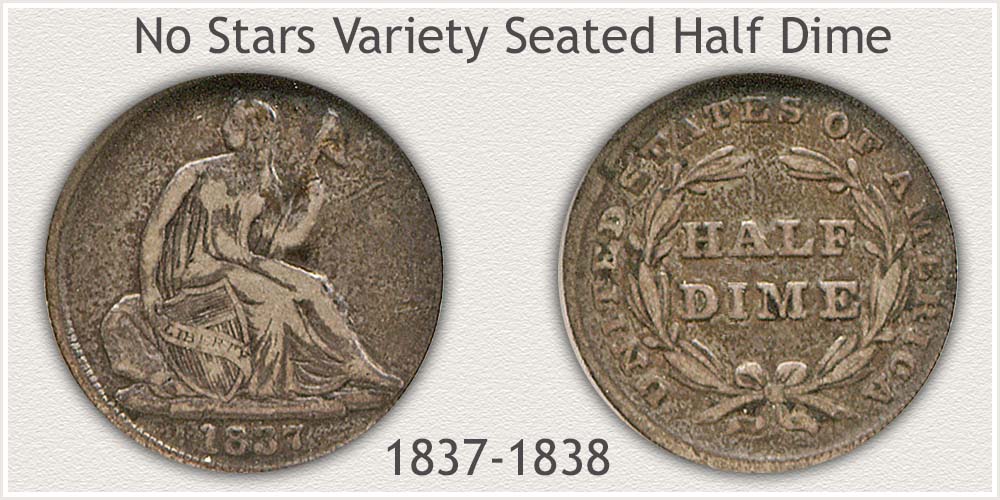
First design of the series is a well detailed figure of Liberty seated holding a staff with a Liberty cap on top. Her right hand is holding a shield with "Liberty" inscribed. The reverse is an olive wreath encircling the denomination. A large ribbon ties the ends of the wreath at the bottom.
These first Seated half dimes are sought by collectors and maintain a solid value. A first of series design, short two-year duration and small numbers minted results in an elusive coin. Most found today are well worn. Sharply detailed coins with minor wear are scarce and represent a premium example.
Stars on Obverse Type: Seated Half Dime 1838 to 1859
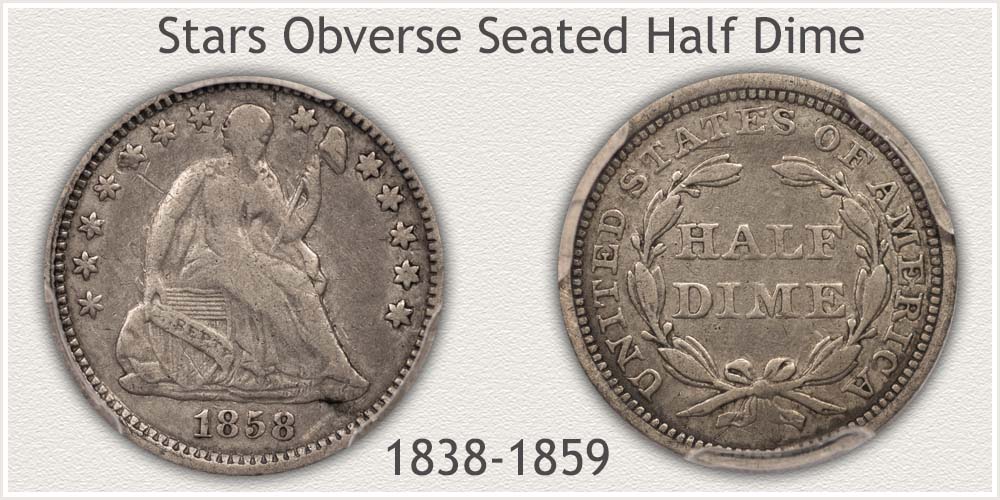
Liberty's seated portrait remains the same. Thirteen stars were added around the border, creating a frame to Liberty and filling in the open fields. The reverse design is the same overall with slight changes to lettering size and style.
Stars Obverse variety contains the largest total production of coins, just over 67 million. Many pieces are available to collectors, their challenge is finding original, appealing examples. Values follow closely the grading scale. A few low mintage dates from each mint are worth well above average for the variety.
Mints of the Stars Obverse Variety Seated Half Dime 1838 to 1859
New Orleans Mint
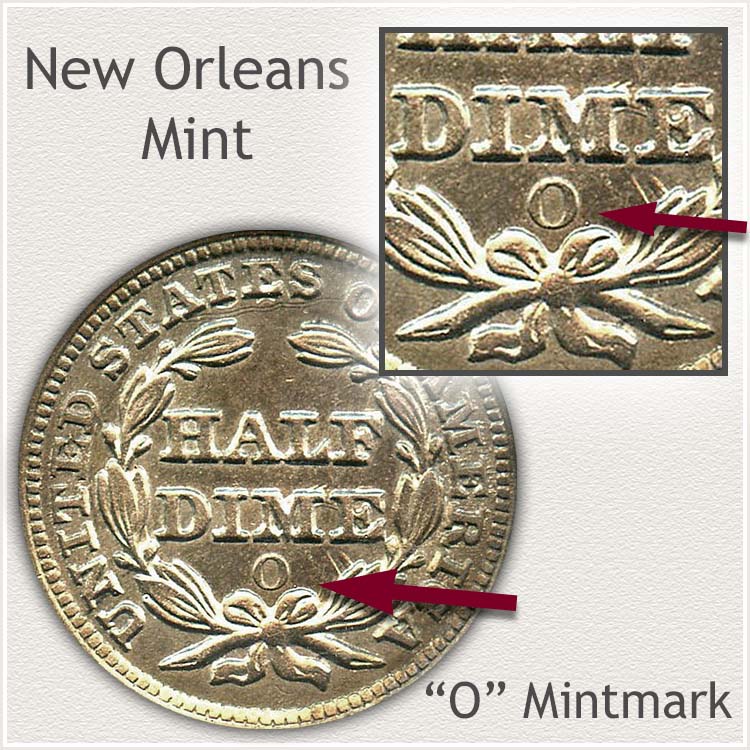
The branch mint in New Orleans added to the production of Seated Half dimes with moderate amounts of coins during the years. These coins are identified by the large "O" within the wreath on the reverse. Just over 16 million were struck with the lowest year 1849 presenting a challenge to find today.
Philadelphia Mint
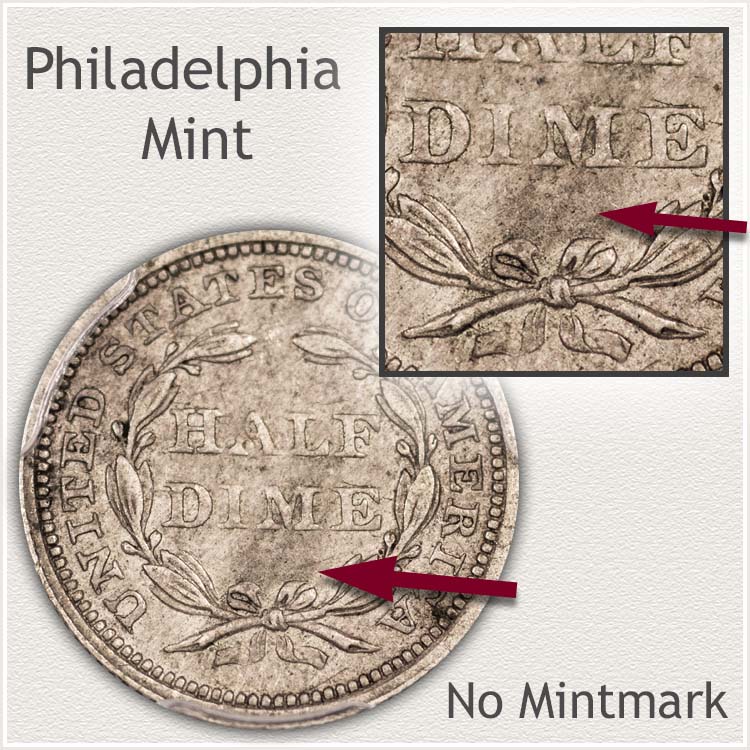
Over 51 million half dimes of the Stars Obverse variety were struck by the main mint in Philadelphia. Producing the majority of coins; these issues are recognizable by the lack of a mint mark. Philadelphia did not place a mint mark on coinage at the time. One year, 1846 is very elusive today, Philadelphia struck approximately 27 thousand 1846 half dimes for circulation with few surviving.
Legend Obverse Type: Seated Half Dime 1860 to 1873
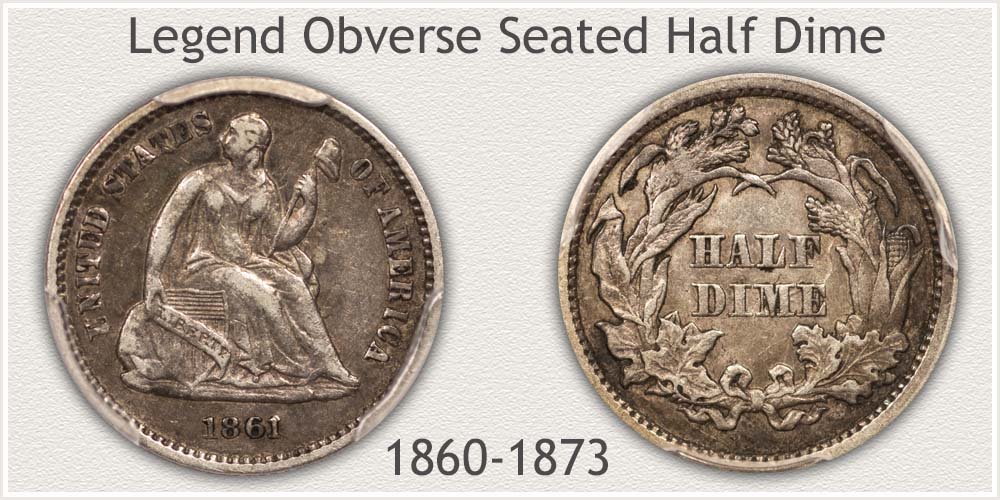
A very noticeable change was made to the design beginning in 1860. Stars are removed and the legend from the reverse is now surrounding Liberty. Her seated portrait is kept the same. On the reverse, removing the legend allowed a redesigned wreath to extend to the rim. Composition of the wreath is distinctly different with corn and oak portrayed. Half | Dime remains within the wreath.
Production numbers lowered dramatically throughout the Civil War years only to recover in the 1870's. Totals minted of Legend Obverse half dimes is just short of 13 million from the mints.
Mints of the Legend Obverse Variety Seated Half Dime 1860 to 1873
San Francisco Mint
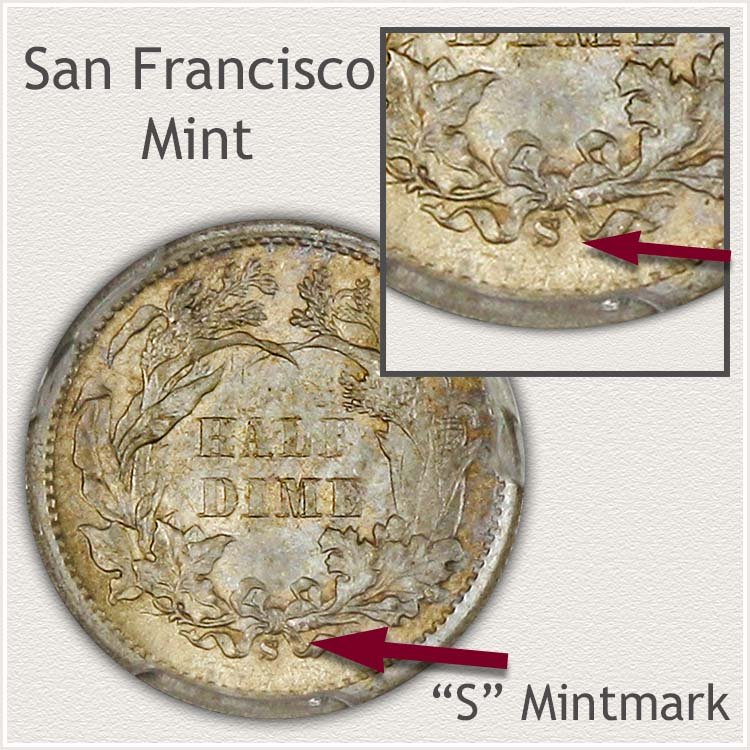
San Francisco minting of seated half dimes is notable as the lowest of the mints. 2.3 million over a short time during the Civil War to the end of the series in 1873.
San Francisco mint issues are identified by the large "S" mintmark just below the knot in the bow tying the wreath. Many "S" mint years are very elusive and seldom encountered.
Philadelphia Mint
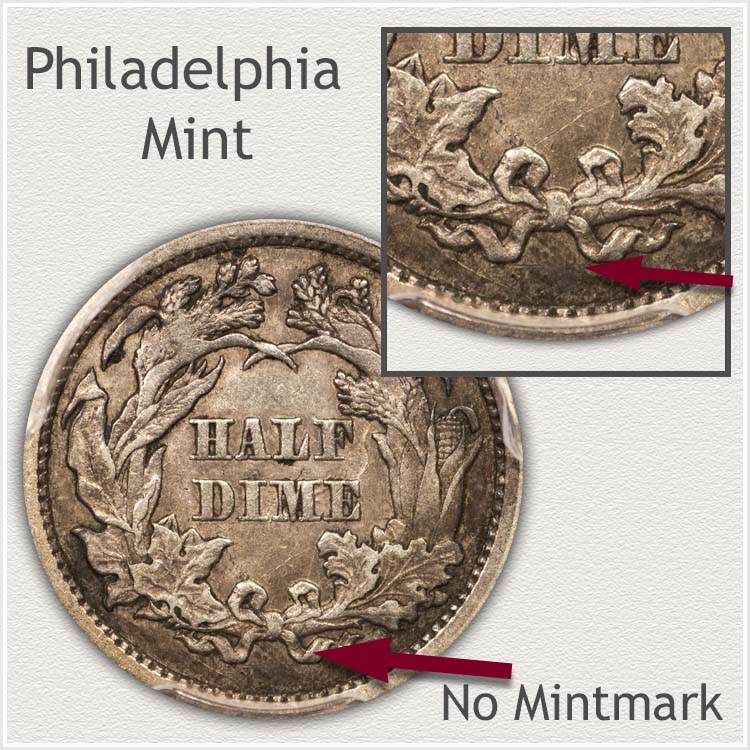
Philadelphia continued to lead in numbers of half dimes produced, although in lower numbers. Philadelphia mint half dimes are identified by no mintmark below the bow tying the wreath on the reverse.
With identity of date and variety known, grading is next to narrow value range.
Step 2: | Grading Condition Narrows Value Range
Examine your half dimes closely comparing them to images found below, each image represents a different grade and ultimately a different value.
Grading Condition of Stars Obverse Seated Half Dime
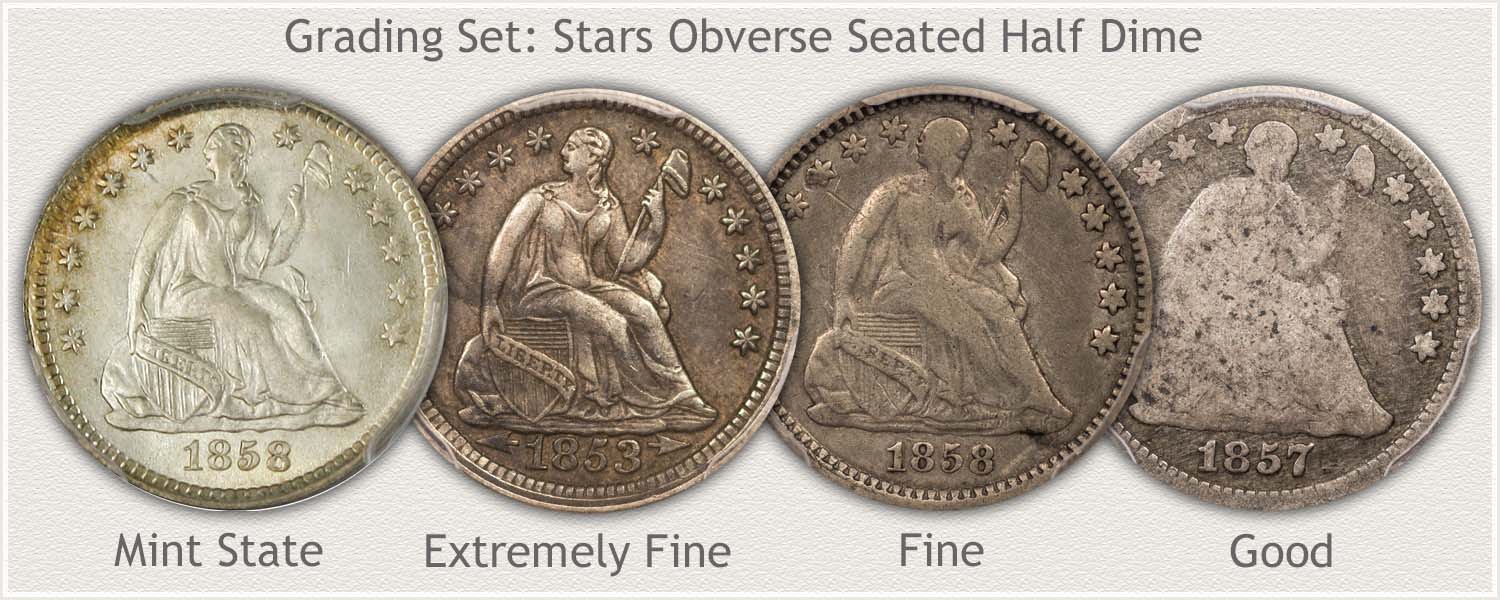
Mint State Grade: Stars Obverse Seated Half Dime
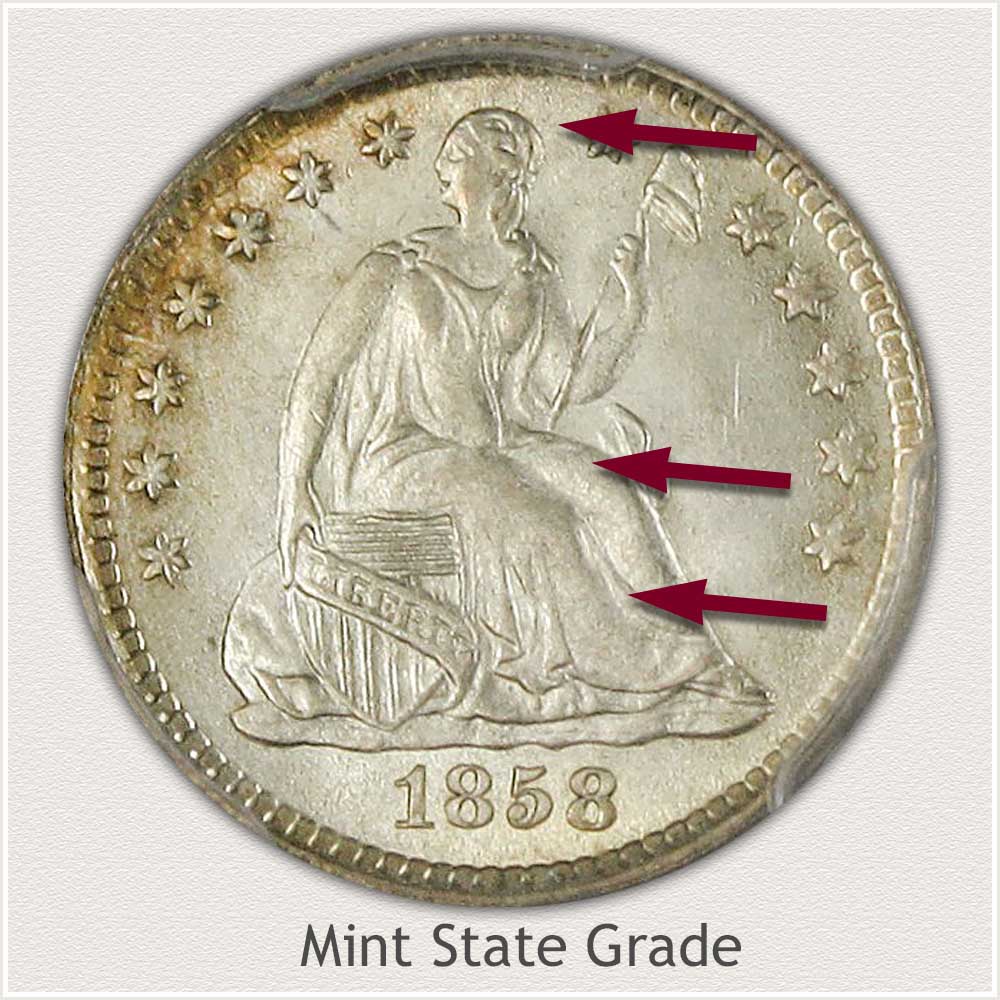
Obverse: Features Identifying Mint State Grade: Liberty's portrait is rendered with fine details in waves of hair to delicate folds in her gown. To reach the mint state grade no wear is found on any of the details. Mint luster still covers the surface.
Liberty's thighs are very high in relief and inspected closely. No smoothing to the metal or changing of texture is noted.
Also, from her knees down her shins would indicate wear if a lack of luster is found.
Waves of hair at the top of Liberty's head are next judged. High areas are checked closely to determine if wear is evident. Presence of soft luster and texture is confirming a mint state - uncirculated grade.
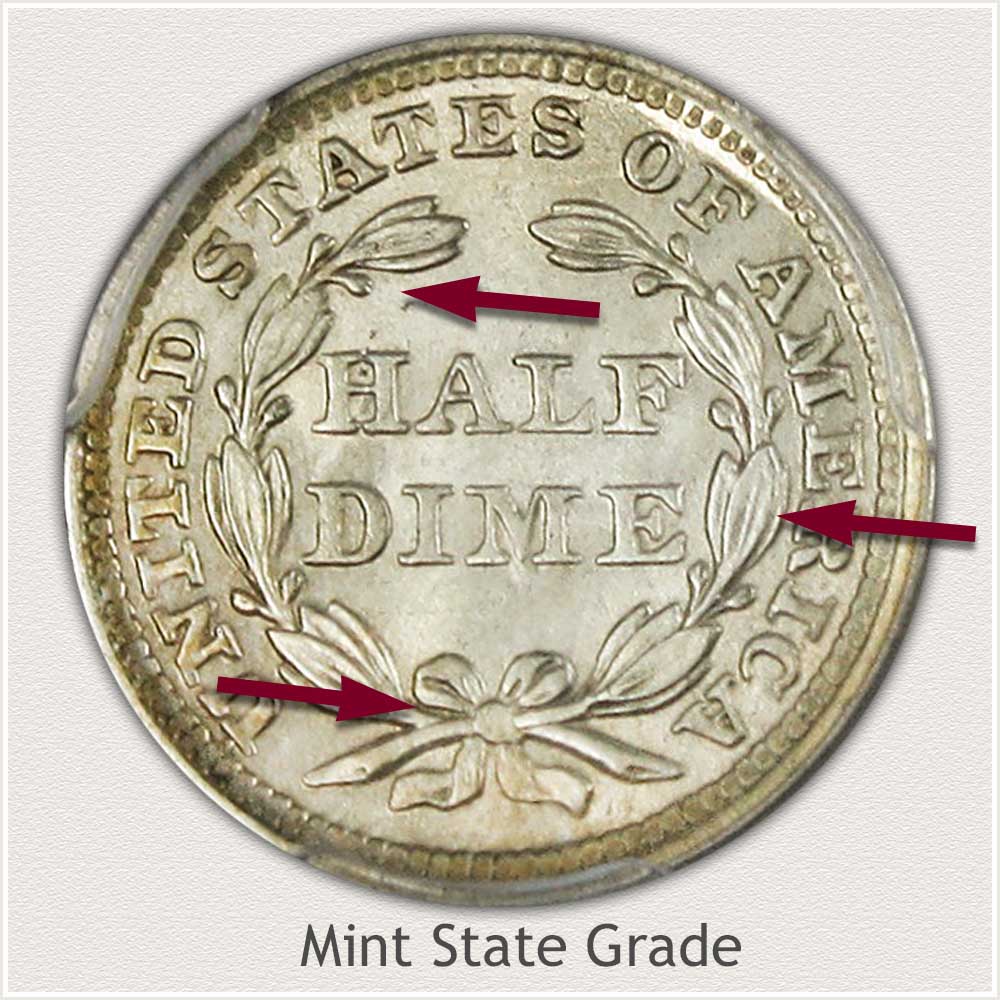
Reverse: Features Identifying Mint State Grade: Within the wreath are many fine details raised high in profile. Each high profile area remains without any smoothing and color change, indicating a coin with no wear to the surface.
Within the wreath, leaves are arranged in groups with an uppermost leaf showing a central line. Inspect these leaves, wear quickly removes the fine center lines.
Leaves at the very top are often softly struck, lacking any central detail. Wear is recognized by a slight change in metal texture and color difference.
Essential to a mint state grade is a bow free of smoothing from wear. All high areas both in the upper loops and lower trailing ends of the ribbon are closely judged. Small flat areas develop quickly in these high spots when worn. The central knot is also judged.
Extremely Fine Grade: Stars Obverse Seated Half Dime
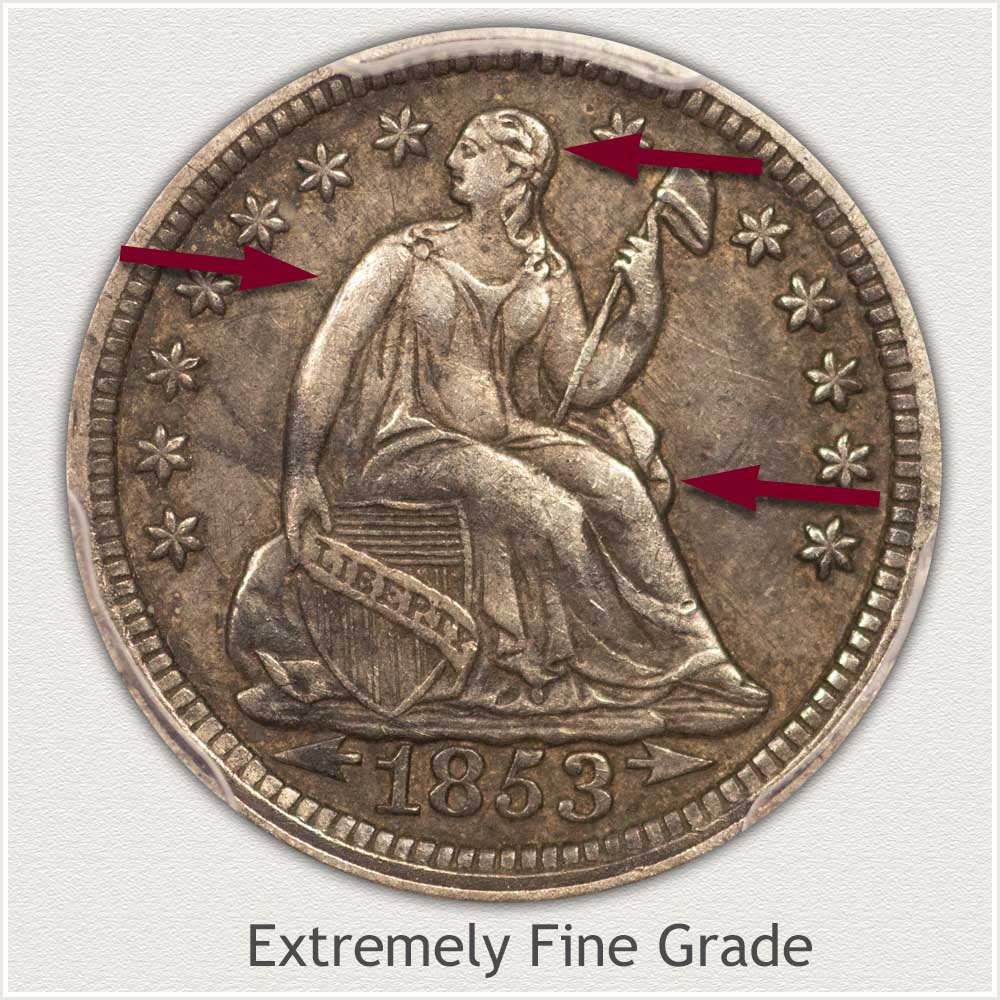
Obverse: Features Identifying Extremely Fine Grade: Light wear confined to the highest elements of design is a coin in Extremely Fine grade.
Features of Liberty's hair and face are just beginning to lose detail. A flatness is noted in her hair with all major strands separated. Her cheek is flattened by wear but is distinct from the hair line.
Along her left arm holding the shield, is evidence of smoothing caused by wear. In extremely fine grade this smoothing is light, only at the very top of the contour of her arm.
Wear has removed a small amount of detail to both knees, only minor smoothing is seen with no large flat areas.
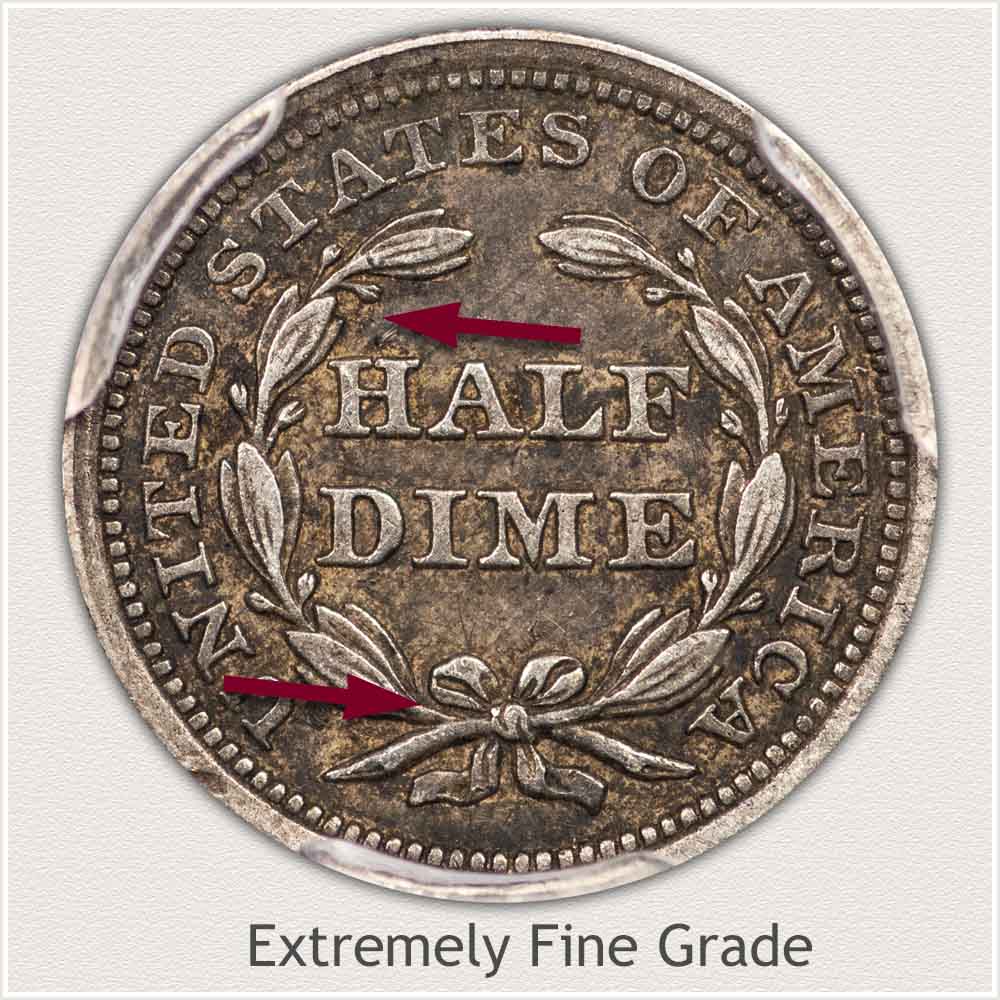
Reverse: Features Identifying Extremely Fine Grade: Wear has reduced upper most leaves only slightly.
Judge closely to confirm each leaf is well separated from lower leaves. Central detail is evident in most upper leaves.
A clear bow remains. All major detail to the upper loops is well detailed, just light smoothing and flatness. Trailing ends to the ribbon show fine detail and the knot is distinct from the stems.
A "crisp" appearance helps identify and define the extremely fine grade. All major elements are bold.
Fine Grade: Stars Obverse Seated Half Dime
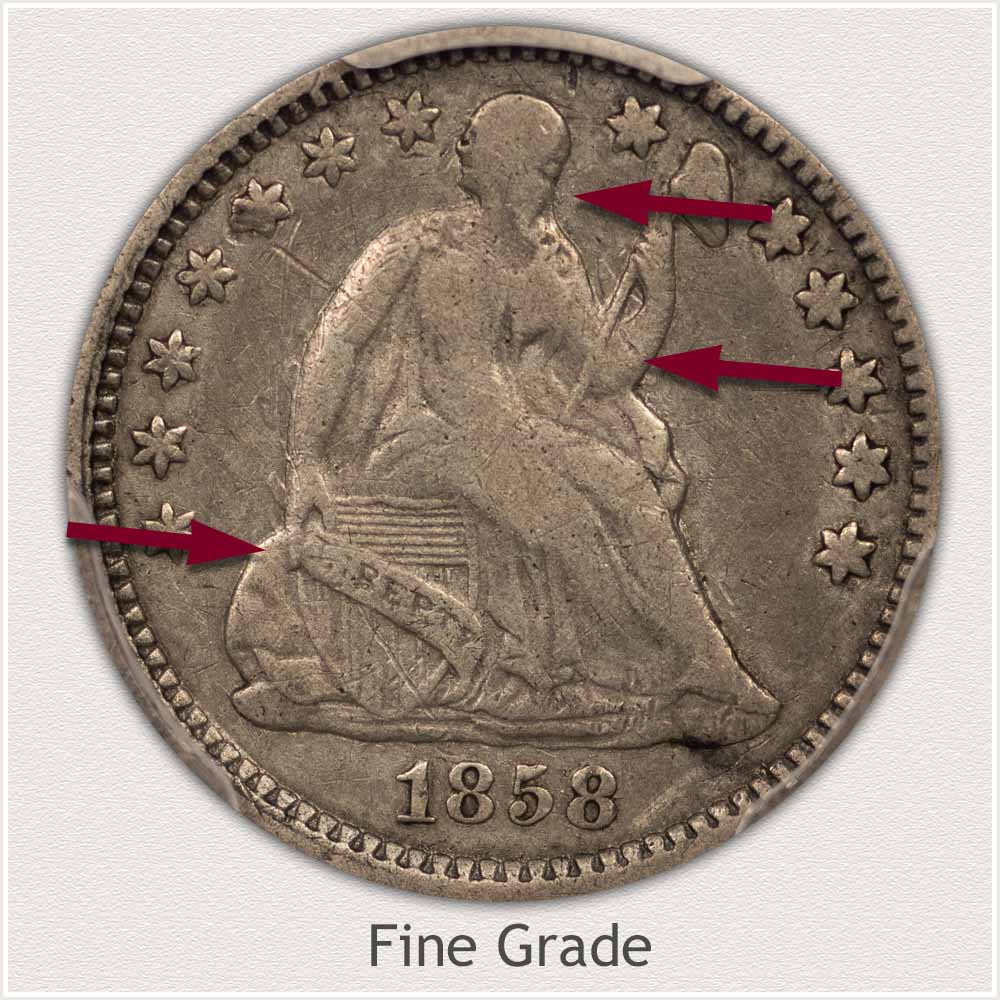
Obverse: Features Identifying the Fine Grade: Visible wear now covers these half dimes in Fine grade. A moderate amount of wear has removed many fine details leaving major details almost to the point of blending together.
Upon close inspection, a small amount hair detail is visible at the back of Liberty's head. Her neck line, in the area, is just visible.
Important to identify the fine grade; the pole crossing in front of her arm is distinct and clear.
"Liberty" inscribed on the scroll across the shield is readable. Lettering is weak and just slightly faded in spots, however, the majority of lettering is complete. The scroll is defined and not merged with the shield.
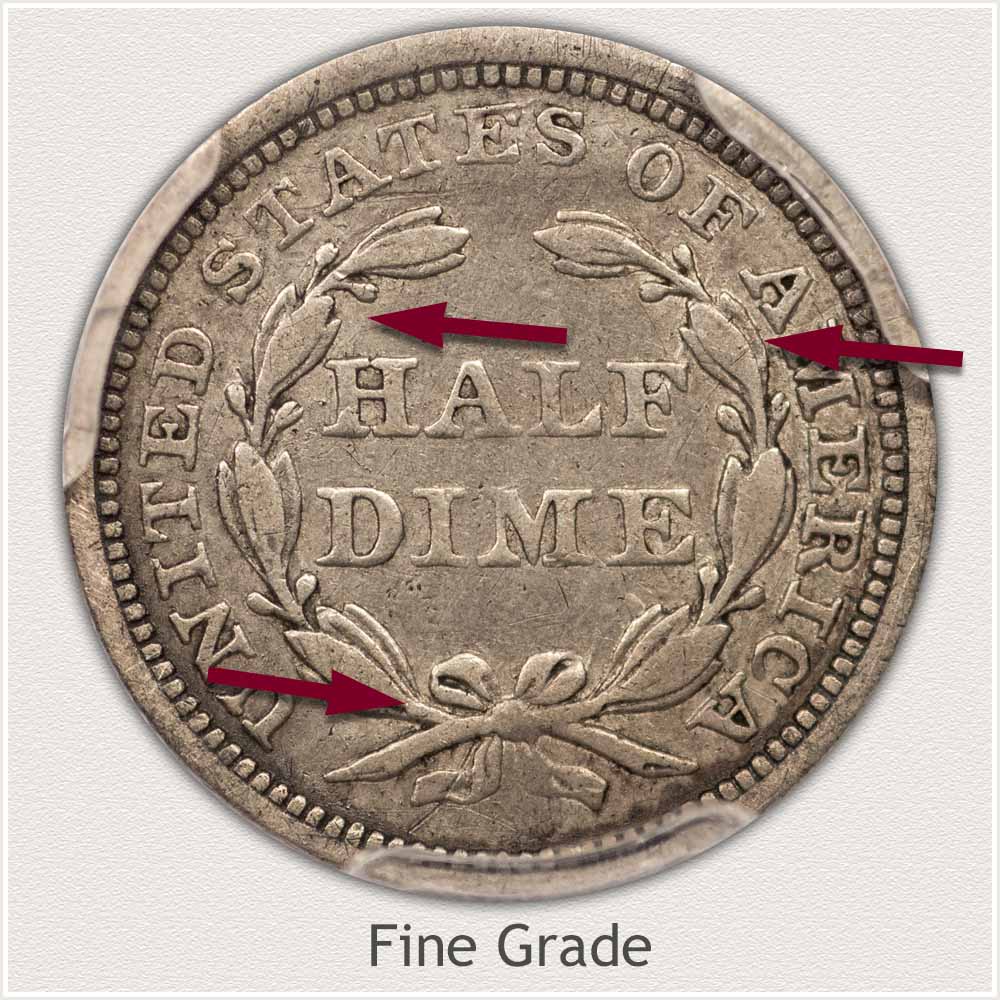
Reverse: Features Identifying the Fine Grade: Leaf clusters are the focus. In Fine grade, individual leaves are separated and clear. An exception is the groups of leaves opposite the "D" and "E" of DIME are occasionally found just beginning to merge in areas. Strike differences are taken into consideration.
Top leaf of the clusters has now worn smooth; no inner detail remains.
A clear knot to the bow combined with separation of the knot from the stems on either side indicates a nice condition coin, within the Fine grade.
Good Grade: Stars Obverse Seated Half Dime
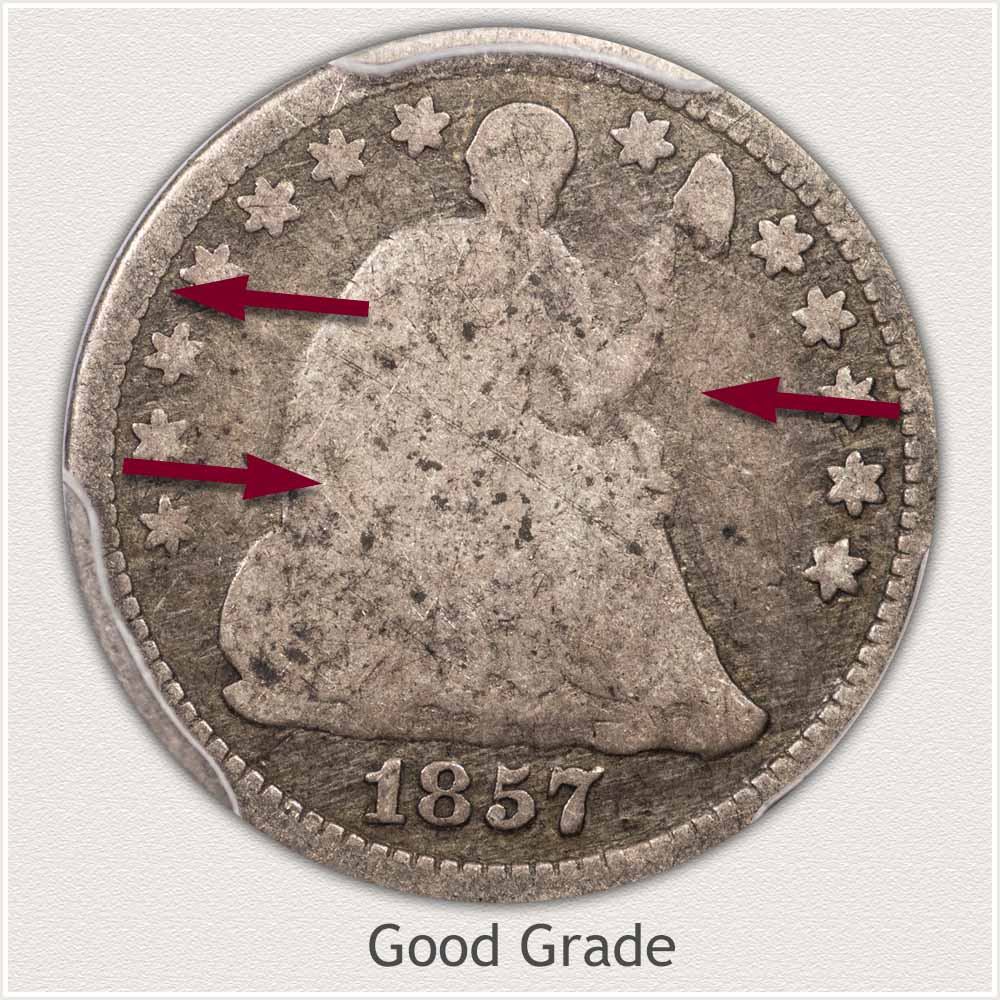
Obverse: Features Identifying the Good Grade: Extensive wear has reduced Liberty's profile to a smooth surface. A coin in this condition is assigned a Good grade.
A strong outline of Liberty must remain. All edges of her outline are raised from the field of the coin.
A clear rim is a defining feature. Stars remain and are not merging with the rim.
Once "Liberty" is missing from the shield, a half dime is placed in the Good grade range.
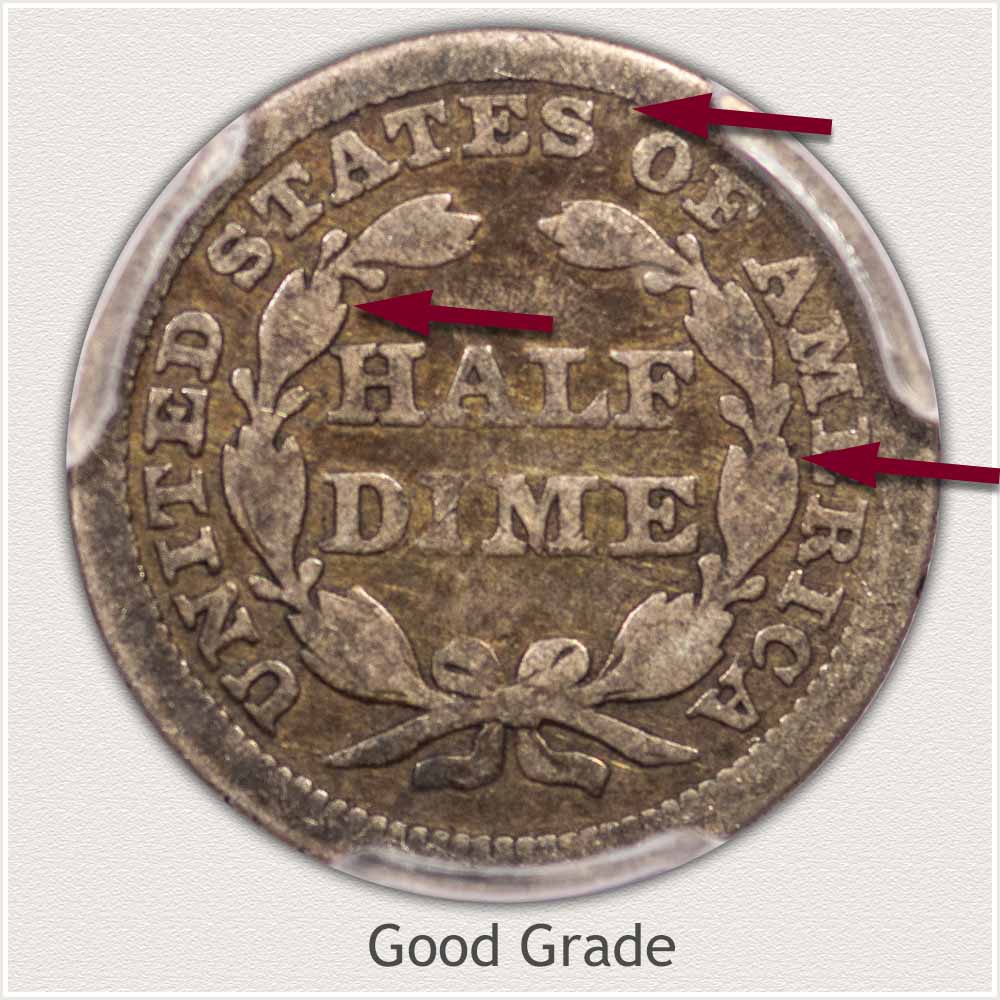
Reverse: Features Identifying the Good Grade: Wear has caused complete fading and merging of leaf edges into smooth groups. With no edges defining individual leaves a half dime is assigned the Good grade.
A complete outline to the wreath remains. The bow is also bold enough to not merge with the field.
All letters of the legend are readable, with small areas of fading often seen confined to tops of some letters. Overall, a defined rim is visible, in places it occasionally shows weakness. A bold, complete rim indicates a strong strike and a solid for the grade reverse.
Step 3: | Special Qualities: The Minor Varieties Enhancing Value
The ability of drawing the attention of collectors plays a key role in a coin's value. Coins are collected by many themes, date run collections are a top choice by many. Type collecting - one coin representing a series - is also widely pursued.
Seated half dimes with the different major design changes offers an interesting type collection. An example of the No Stars along with the Stars and Legend designs is a popular 3-coin type set with collectors. Adding a further example would include the "Arrows at Date" minor variety.
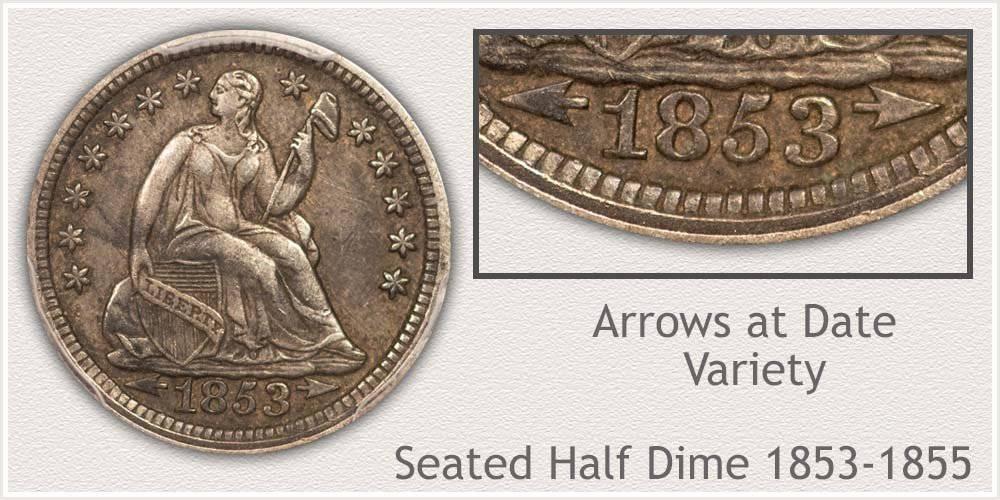
Arrows placed on either side of the date in the years 1853 to 1855 is a visual design change. A change denoting lower total weight of the coin and a distinct look. Including one in a type collection is needed and results in these coins are always in demand. A steady need by collectors is a special quality found in the 1853 to 1855 half dimes. In overall terms these "arrows at date" pieces are not rare; however, they are continually sought.
References
US Mint. 1873 US Mint Annual Report
https://nnp.wustl.edu/library/book/516173
US Mint. Catalogue of Coins of the United States
https://nnp.wustl.edu/library/book/554591
Finance US Senate. Coinage Laws United States 1792 to 1894
https://archive.org/details/coinagelawsofuni1894comm/page/828/mode/2up
Coin Values | CoinStudy Articles
Old Coin Values Using a Step by Step Method
A step by step method is used to discover old coin values. Beginning with identifying important dates and mintmarks. Next comparing your coin to images to judge and determine its condition and recognize its "grade". Value charts narrow how much coins are worth.
Return to the index page leading to the rest of the half dime series. These small silver coins were first struck in 1794 and continued through 1873 involving many design changes. Value charts cover the series and grading images with descriptions judge condition. Branch mints began to produce half dimes and now identifying mintmarks becomes important to pinpoint how much the coin is worth.
Coin Value Guide | How to Value a Coin Collection
A step by step method combined with the coin value online guide identifies how to value a coin collection. Discover how much your box of old coins is worth.
Introduction into the selling coins process. Preparing, organizing, and planning all combine to improve results.
★ Coin Values Discovery finds Seated Half Dime Value and...
All old US coin values. It is an excellent index with images and text links to all coin series, from Cents to Gold. Value charts, grading images and a step by step procedure uncovers how much your box of old coins is worth.
